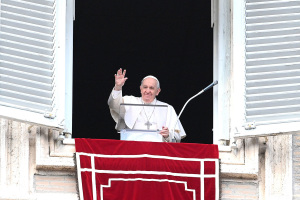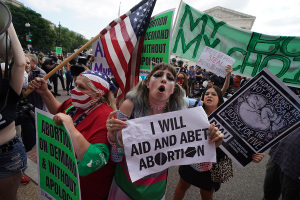Jewish groups defend Christian postal worker at center of Supreme Court sabbath case

Jewish groups have come to the defense of an Evangelical Christian postal worker who claims he was forced out of his job for refusing to work Sundays, the Christian day of the sabbath.
A joint amicus brieffiled last Tuesday by the American Jewish Committee and religious scholars Asma Uddin and Steven Collis asked the U.S. Supreme Court to rule in favor of Gerald Groff, who began working for the U.S. Postal Service in 2012 and accused his former employer of refusing to provide reasonable accommodations for his religious practices.
Groff claimed that he was forced to resign from his job in 2019 because USPS would not “honor [his] personal religious beliefs.”
After the U.S. 3rd Circuit Court of Appeals ruled against Groff last year, the Supreme Court will hear the postal worker's case, Groff v. DeJoy, on April 18.
Groff is asking the court to reconsider a ruling in the 1977 case Trans World Airlines v. Hardison, which set limits for the accommodations employers are required to make for religious employees on the Sabbath.
The brief supported by the American Jewish Committee argues that the interpretation of “undue hardship” in Hardison permits employers to escape liability and avoid any need to accommodate even the “most modest needs” of their religious employees under Title VII. As the brief noted, the act was amended in 1972 to protect employees that practice the Sabbath on Saturdays and other religious minorities.
Furthermore, the brief stated that religious discrimination still exists within the American workplace by allowing employers to claim “undue hardship” under the Hardison standard. The brief argues that the standard is particularly harmful to minorities, including Muslims, Jews, Sikhs, Seventh-day Adventists.
Despite comprising only 5% or 6% of the U.S. population, these groups bring over 65% of religious discrimination cases, of which two-thirds result in claimants losing in appellate courts due to the Hardison standard, according to the brief.
The Quarryville Postmaster in Pennsylvania, where Groff worked, entered a contract with Amazon in 2013 to deliver packages, which included Sundays, although Gross was initially exempt.
However, in 2016, the USPS and the National Rural Letter Carriers’ Association, a union, entered an agreement that required Groff to work Sundays during the peak season. The postal worker transferred to a smaller office, which also started doing deliveries through Amazon.
Groff claimed that his employer required him to find people to cover his shifts if he did not want to work on Sundays. He eventually resigned after facing multiple disciplinary actions for not working on Sunday when scheduled.
“Rejecting the Hardison standard and thawing its chilling effect will not result in a flood of expensive claims that injure American businesses,” the brief argued.
“In fact, this Court should expect that increased religious accommodations in the workplace will help American businesses, in the same way that disability accommodations maximize the value of disabled employees.”
Another amicus brief filed on Feb. 28 by the Zionist Organization of America made similar arguments about the 1977 Supreme Court ruling. The group argued that employers are free to deny religious employees “the most minor accommodations.”
“The interpretation of ‘undue hardship’ as nothing more than a de minimus cost to the employer is not supported by the plain meaning of the term,” the brief argued. “‘Hardship’ alone means more than de minimus or insignificant. Dictionaries define ‘hardship’ as ‘adversity,’ ‘suffering’ or ‘a thing hard to bear.’”
The group also called for re-evaluating the “undue hardship” standard on the basis that violence against Jewish people in the U.S. is reportedly on the rise.
“To discourage anti-Jewish bias and ensure equal employment opportunity for Jews, Title VII’s ‘undue hardship’ standard should be re-evaluated, and the de minimis cost standard abandoned,” ZOA wrote.
Another group that has voiced its support for Groff is the Anti-Defamation League, a Jewish civil rights organization that joined with several other religious groups to file a Feb. 28 amicus brief.
“Religion is a protected class under the law and must be treated that way. If religious protections for employees can’t be enforced, they are effectively meaningless,” ADL CEO Jonathan Greenblatt said in a statement. “People of faith will forever be unable to participate fully in society if they are forced to choose between their religion and earning a living. We urge the Supreme Court to revisit this decision and adopt a legal standard that will more effectively protect religious accommodations in the workplace.”
ADL was joined in submitting the brief by the Baptist Joint Committee, the Church of Jesus Christ of Latter-day Saints, the U.S. Conference of Catholic Bishops, National Association of Evangelicals and the Ethics & Religious Liberty Commission of the Southern Baptist Convention.
Samantha Kamman is a reporter for The Christian Post. She can be reached at: samantha.kamman@christianpost.com. Follower her on Twitter: @Samantha_Kamman





























